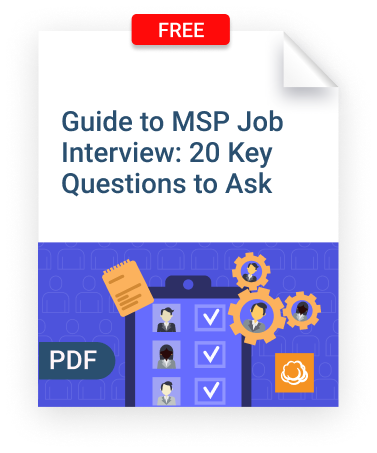Choosing the right new hire is one of the most important decisions a company can make, as it builds the technical skills of the organization and can also drastically affect its culture. Ensuring you make the best hire for your MSP business starts with asking the right interview questions.
On the most basic level, carefully crafted interview questions ensure that the candidate has the right skills to be successful in their role. For an MSP, that might include previous history working with specific technologies, certifications, or strong communication skills for client interactions.
On top of that, interview questions can also help determine a candidate’s maturity, self-awareness, and cultural fit. These softer skills are what will help determine if you are not only hiring the best person for the role, but also someone who will be a good fit for your company.
What those “ideal” characteristics are will vary greatly from company to company. For instance, one MSP might have a strong focus on cybersecurity and might put more emphasis on those skills. Another might use customer service as a unique differentiator, therefore putting more weight towards communication skills. Each business leader should start by taking the time to figure out what those top items are for their individual situation, as well as for the specific role.
Further reading HR for MSPs: Essentials for Critical Human Resources Topics
Once those characteristics have been determined, you can develop questions to figure out if candidates have those specific qualifies.
Some question topics might include:
- What personal qualities make them stand out from their peers.
- Ask them to describe how they used a specific important quality in a real-life situation.
- Ask them to explain how a certain technology works that is important to your business.
- Ask them to draw a network they know well (maybe their home network) in as much detail as they can, then ask them technical questions about it.
- Provide them with an example of a customer problem you see regularly in your business or a recent ticket request and ask them to describe how they would handle it.
When developing a question list, it’s important to remember that not all questions will be the same for each role, as the qualifications will be different. Expectations for the quality or comprehensiveness of answers will also vary based on role. For instance, you don’t need L1 candidates to be technical, you only need them to be adequate. Meanwhile, an L2 would need to be both technical and adequate.
Further reading Guide to MSP Help Desk Structure
It’s also true that not all interviewers are the best choice for all candidates. For example, a non-technical executive might not be able to fully determine if a candidate for a technical role is fully qualified. Likewise, not everyone knows how to successfully interview salespeople and determine qualifications. Don’t be afraid to ask a colleague that may be more qualified to lead the interview or provide a second opinion.
Finally, it’s worth considering how your questions will attract a candidate that will grow and evolve your company. A diversification in skills, backgrounds, and cultures can lead to richer company culture, as well as improve overall business performance.
While the interview process can be stressful for all involved, it’s also an exciting moment for an MSP. Each new hire brings unique experiences, skills, and backgrounds that will inevitably help grow the company for the future. A thorough interview process ensures that everyone wins in that scenario.






